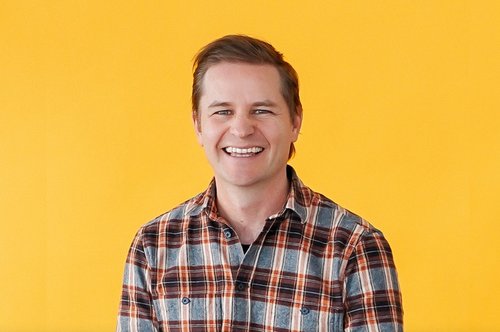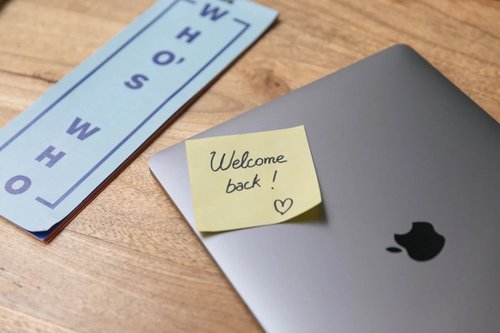Seth Jaffe changed careers 7 times. Here's what he learned
13. 6. 2022
7 min.


Journalist
How many times can you change professional paths in a lifetime? “At least seven!” would be the self-proven claim of Seth Jaffe.
From engineer to fashion photographer and software technician, Jaffe has made a career out of, well — changing careers. Now at number seven, he works as a lawyer out of Texas and has just released his book “Career Recon: How To Get The Most Out Of Higher Education or Bypass It Altogether.” Aside from the many skills Jaffe picked up along the way, changing areas of expertise also made him realize the financial and mental stress of building an eclectic resume. In 182 pages, Jaffe packs in all the lessons learned from his prior mistakes and shares the tricks and tools to better shape the outcome of a career change.
First, I have to ask you why you changed careers so much?
I think part of it is I got influenced. During the dot-com boom of the late 90’s for example, some family members encouraged me to get into that world. And I did. It was like chasing after the latest craze, but I didn’t know what I was getting myself into. And then I did a lot of side hustles. In the end, I guess I was searching for the perfect job, for a career that I thought would make me happier.
“I guess I was searching for the perfect job, for a career that I thought would make me happier.”
You first wrote Career Recon 10 years ago. Do you have the feeling more people are changing careers now than back then?
It’s difficult to say, but it seems clear from all the articles that are coming out that a significant number of people are considering a career transition. But I wonder if they’re just talking about changing jobs or changing careers, there’s a huge difference. Either way, I’m thinking social media may be playing a part: suddenly we have the ability to peer into everyone’s career windows. How many times a day are you bombarded with that self-congratulatory post on LinkedIn by one of your connections? And they seem so happy when they receive this award or promotion. So you think to yourself, ‘well, maybe I’ll go do that, and then I’ll be happy, too.’ It’s almost like an advertisement to change careers.
“I’m thinking social media may be playing a part: suddenly we have the ability to peer into everyone’s career windows (…) it’s almost like an advertisement to change careers.”
According to a recent poll, more than half (52%) of American employees are considering making a career change this year, and 44% are already planning to make the switch. Is it more important than before? How do you see the evolution of our relationship with work?
Honestly, I don’t know the answer to this question, but let me just ask you: do you think that previous generations idealized executives as rock stars like we do? Do you think that employees were expected to answer emails at all hours of the day and night, including weekends? Maybe it’s partly because the companies streamlined after the 2008 financial crisis. They became more efficient. And then with Covid, they became even more efficient. But on the other side, employees are waking up and saying, ‘I’m working way harder than I used to work and I haven’t really been paid more.’ This may explain why people are looking for a better work-life balance now.
“Employees are waking up and saying, ‘I’m working way harder than I used to work and I haven’t really been paid more.’”
Can you tell us more about the Career Recon method?
I divided the method into three parts. The first part is running the numbers and analyzing the cost benefit of the traditional path of careers - going to a four-year university and getting a degree. Most people following that route only think about the cost of tuition, but you need to think about it as ‘these are four years that I’m out of the workforce, four years that I would have been making a certain amount of money’. It’s also four years that you would have been saving for retirement. Plus many people go in debt to pay for tuition, so the question is: what is the cost of school? There’s also the cost of time, it takes a lot of time to go to school, and the cost of stress as schools have become much more competitive.
“What is the cost of school?** There’s also the cost of time, it takes a lot of time to go to school, and the cost of stress.”
The second part of the Career Recon method is about reconnoitering the landscape and acquiring actionable intelligence on a given subject, whether it’s a school or a field. You’ve got to get the information so that you can make an informed decision and create a real actionable plan forward.
And the final part is just exploring unconventional and alternative paths into that career. What are ways of either gaming the system to get into a good school in such a competitive environment? Or can you just bypass that school and utilize some of the amazing technology and offerings out there today?
Your method includes the process of “Reconnaissance.” Can you quickly explain what it is?
When determining and transitioning careers, you acquire a lot of information along the way, and you need a way to record it, analyze it and utilize it for your benefit. Using the reconnaissance method allows you to do that. What surprises me is how little time folks usually spend on career research, even though it’s a crucial step.
The process of reconnaissance involves five stages that I lay out in the book. The first is the initial research: you’re looking for trends, major players in the space, recurring themes, regulatory shifts. Here you’re looking for those up-and-coming fields and something you could be excited about. Then the second phase is blanket solicitation: you want to talk to a lot of people and figure out the real truths. The third part is the target solicitation: a moment will come when you’ll go talk to somebody, and you will know 95% of what they’re saying better than them. But you might be missing the “5% more” – the percentage of things that you didn’t know and that might be the big win. The fourth part is the review of all the information you’ve collected and then you get to the fifth part, which is creating an actionable plan.
Why do you think some people fail in succeeding their career switch? What’s the most common mistake?
I would look at it both ways. There are some people who don’t succeed in making the switch, and those who make the switch but are unhappy with the outcome. The reasons for failure vary: maybe it was too hard, maybe it was because you didn’t know enough, maybe you finally realized you didn’t like the field. That’s why you want to know the landscape beforehand, and always take a moment to look at your data and say, ‘is this still the right thing for me?’
Some people are more into an intuitive approach of “following their dreams” but it seems that a successful career switch requires work and a clear methodology. Is there a balance to strike between the two?
The way I see it is you have to be excited about your career change. Because it’s a huge amount of work, it’s a time commitment, it’s a cost and it is highly stressful. Also, you don’t want to transition to a career where you’re unwanted, that’s why I suggest you look for burgeoning areas in fields that you are already in.
Networking has always been highlighted as a key to building a career. Has that changed? What’s the most important factors to keep in mind today?
There are tricks to networking. One is to write everything down about the people you meet. I recommend joining a trade association, going to conferences and networking sessions to get in front of the right people. It’s important to take notes on everything you can during these events because that’s the meat of what you can use later on.
I remember going to a luncheon one time, I didn’t recognize any of the people I was sitting with but I pulled out my database program, punched in their names and, sure enough, I’d had a previous connection with four out of the five. Thanks to my notes, I was able to tell them where we’d met, what we’d talked about, etc. It’s a tremendously powerful way of networking. Another way is to get out there and publish or do research. Oftentimes, you’ll find that people at the top of their field have ideas about things they want to do, but don’t have the time. But if you’re willing to do the research or write a paper, they will assist you in publishing that paper. That’s a great way to get a connection, as more of a colleague than as a student-teacher situation.
People who change careers often start a new degree, but in your book you explain there are alternatives to conventional education. What value do diplomas have nowadays?
The connections you make in school, especially an Ivy League school, are certainly a benefit. But you’ve got to look at the ticker moving down, and I think the world is moving that way. Earlier this year, companies such as Apple, Tesla, Facebook, Google, IBM or Netflix, all said they no longer require a college degree to work. What’s more, there are a host of alternatives to getting a conventional education. A lot of trade associations offer their own certifications, you can do self-study, there are targeted courses like Coursera.com, and increasingly very esteemed and accredited universities such as Stanford, M.I.T., Harvard are offering free courses. Doing an internship is also key whether you have a degree or not. That’s how you set yourself apart, with having all this additional experience.
If you could give one piece of advice to someone who wants to change careers, what would it be?
The way I look at it is ‘give yourself a leg up’. Work smarter, not harder. It’s not just about grades anymore, there’s just too much competition out there. You have to game the system a little bit, and make sure you go into a career change with your eyes wide open.
Photo: Seth Jaffe
Follow Welcome to the Jungle on Facebook on LinkedIn and on Instagram and subscribe to our newsletter to get our latest articles every day!

Další inspirace: Profesní rozvoj

Meet the CEO making tech careers available to everyone
"I wanted to prove that online learning could also be human-centric" -Martin Ramsin, founder and CEO of CareerFoundry
01. 2. 2023

The people behind TikTok’s #iquitmyjob movement
Three creators tell the story of why they quit their jobs, and why they let millions of people see it online.
06. 9. 2022

How honest should you be when quitting your job?
Handing in your notice can be a necessary decision. But should you always tell the truth about your reasons?
21. 6. 2022

Should you quit your job, or quit your environment?
Quitting your job can be a difficult but necessary decision. So how do you know if it's the right choice? A Florida-based career coach weighs in.
19. 5. 2022

The Boomerang Boom: how to go back to your former employer
As the big quit continues, we’re seeing another trend: the boomerang employee. We have some tips to help you with ‘the Great Return.’
12. 5. 2022
Zpravodaj, který stojí za to
Chcete držet krok s nejnovějšími články? Dvakrát týdně můžete do své poštovní schránky dostávat zajímavé příběhy, nabídky na práce a další tipy.

Hledáte svou další pracovní příležitost?
Více než 200 000 kandidátů našlo práci s Welcome to the Jungle
Prozkoumat pracovní místa